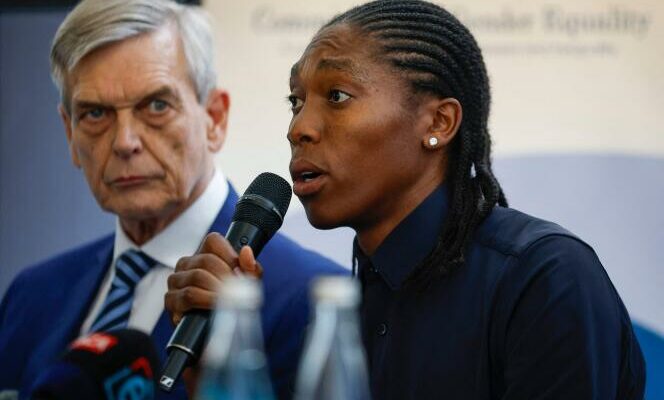“We are short of funds. We have a lot of experts who come and who we have to pay. » Prevented from taking part in certain races because she refuses treatment intended to lower her testosterone levels, South African athlete Caster Semenya asked for help on Friday February 9 to finance her legal battle against this regulation. “Whatever you can do, it makes a huge difference”, she continued at a press conference in Johannesburg. On this occasion, the double Olympic 800m champion (2012, 2016) specified that a hearing on her case will be held before the Grand Chamber of the European Court of Human Rights (ECHR) on May 15.
In July 2023, the 33-year-old sportswoman won a first long-term battle, when the ECHR ruled in her favor at first instance against Switzerland, finding that she was the victim of discrimination – the decision was only rendered by a narrow majority of four judges to three. The Swiss authorities, supported by the International Athletics Federation (World Athletics, formerly IAAF), then announced their intention to bring the case before the Grand Chamber of the ECHR, a sort of appeal body whose decisions are final.
A World Athletics rule
Swiss justice confirmed, in 2020, a decision of the Court of Arbitration for Sport validating a World Athletics regulation, which requires hyperandrogenic athletes to take hormonal treatment in order to lower their testosterone levels if they want to align with their fetish distance.
“Switzerland exceeded the reduced margin of appreciation it enjoyed in the present case which concerned discrimination based on sex and sexual characteristics, which can only be justified by “very strong considerations””estimated the ECHR, in its decision of July 2023.
“The significant stakes of the case for the applicant and the reduced margin of appreciation of the respondent State should have resulted in in-depth institutional and procedural control, from which the applicant did not benefit in this case”she continued.
The ECHR ruling did not, however, invalidate the World Athletics regulations. Nor did it directly open the way for Catser Semenya to participate in the 800m without treatment. “The current regulations on DSD [différences du développement sexuel]approved by the Council of the International Athletics Federation in March 2023, remains in place »had, in fact, clarified the instance.
Caster Semenya has a natural excess of male sex hormones and has been engaged in a standoff with the international federation for more than ten years, calling for respect “dignity and human rights”. In March 2023, World Athletics tightened its rules for hyperandrogenic athletes, who must now maintain their testosterone levels below the threshold of 2.5 nanomoles per liter for 24 months – instead of 5 nanomoles for six months – to compete in the women’s category, regardless of distance.
